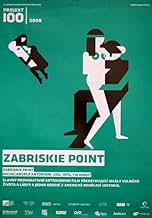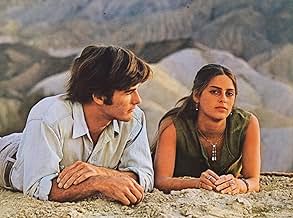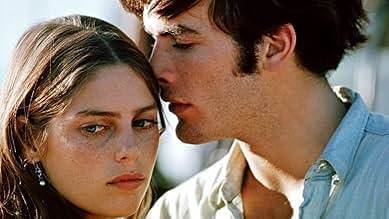Am Zabriskie Point, einer der tiefstgelegenen Stellen der Vereinigten Staaten, treffen sich zwei vollkommen Fremde: ein Student und eine junges Hippie-Mädchen, die eine hemmungslose Romanze ... Alles lesenAm Zabriskie Point, einer der tiefstgelegenen Stellen der Vereinigten Staaten, treffen sich zwei vollkommen Fremde: ein Student und eine junges Hippie-Mädchen, die eine hemmungslose Romanze beginnen und sich im Staub des Death Valley lieben.Am Zabriskie Point, einer der tiefstgelegenen Stellen der Vereinigten Staaten, treffen sich zwei vollkommen Fremde: ein Student und eine junges Hippie-Mädchen, die eine hemmungslose Romanze beginnen und sich im Staub des Death Valley lieben.
- Auszeichnungen
- 1 Gewinn & 1 Nominierung insgesamt
- Radical student
- (Nicht genannt)
- Police lieutenant on loudspeaker
- (Nicht genannt)
- Highway patrolman
- (Nicht genannt)
- Airport mechanic
- (Nicht genannt)
- University student
- (Nicht genannt)
- Arrested student
- (Nicht genannt)
- College student
- (Nicht genannt)
- Man in Deli
- (Nicht genannt)
- Gun store owner
- (Nicht genannt)
- …
- Departing Plane Passenger
- (Nicht genannt)
- Documentary cameraman
- (Nicht genannt)
Empfohlene Bewertungen
The movie has some jewels, and among them the most shining are the 10 final minutes. The oneiric explosion sequence, with the music that comes and goes, with the time expanded and slowed down, with the kitsch colours of meaningless objects moving upward in the blue sky. In the movie history this is one of the best images of the explosive and destructive power of the ingenuity of that generation, that wanted to live changing the existing rules. Playing with colour, time, sounds and music Antonioni has given once more a proof of his unforgettable art: he is at the same time a painter, a music composer, a dancer, a poet.
The subsequent burial by the studio is understandable, after such a whopping investment and dismal return. It is sad that people don't get to see this film any more as i believe Antonioni has been proved right. Here he predicts the end of the hippie/civil rights movement in the politics of America. Everyone is much more interested in what goes into their pockets and the relentless expansion of living space into the inhospitable (yet beautiful) desert and beyond. How i would love to see interest in this film re-kindled and a lavish DVD release.
I beseech people to watch Zabriskie Point with an open mind and an open heart. We have a genuinely unique film commenting on a turning point in the history of the most powerful nation on the planet, and we have forgotten about it.
An unexpected gem.
I have lived away from the US for 30 years and can now pretend to be able to understand what Antonioni was wanting to achieve. My view is that he has excelled. The film is a stunning indictment of the United States and, tragically, I see no remediation in the 29 years since it was first released.
Zabriskie Point starred two very appealing leads that should have become big stars of the 70s, but never did. Mark Frechette, whom I'd already seen in Francesco Rosi's fine WWI-set movie Uomini Contro, had a very tragic life and died aged just 27. According to his biography page, he donated his $60,000 earnings from Zabriskie to a commune. Mark's co-star Daria Halprin, apparently also Dennis Hopper's wife later on, has the stunning, natural beauty and appeal of a young Ornella Muti one of those luminous beauties that don't need a shred of make-up to turn heads. Like Frechette, she has only graced a couple of obscure movies and has never become a star, but at least she didn't die tragically. Most notably, Zabriskie Point contains one of the most original sex scenes ever filmed - one that brings home a sense of youthful playfulness like few I've seen - as well as a powerfully cathartic ending. It may be the most banal sequence ever filmed as far as its symbolism goes, but I can't see how anyone can deny its beauty and wonderful sense of emotional release. Never has an explosion looked so good, and so poetic. It seems to be an explosion that restores order rather than bringing chaos.
Antonioni's predictable assault on capitalism is not only intellectually hollow, but has (or had) nothing new to offer; it's just the same old trigger-happy one-dimensional cops, businessmen discussing business deals (and what's wrong with that, isn't that how Antonioni's movies get made?), and endless shots of TV commercials and billboards advertising the oh-so morally decadent products for the abhorrent, selfish, and greedy right-wing rabble-population who thinks of no one but themselves, their families, their work, and their children.
Papa Smurf Antonioni, just like his long-haired Smurfs and Smurfettes of the late 60s, failed to notice the most obvious and vital aspect about their silly movement: they were allowed to have their laughable meetings and express their anti-establishment opinions freely within that very establishment, whereas the students in those countries whose left-wing systems they admired, did not (and still do not). By far the greatest irony about the hippies - and Antonioni, naturally, failed to realize this as well (his judgment being clouded by cocaine-snorting and an excessive intake of LSD) - is that hippies were (are) the garbage-residue of capitalism. This is an incredible irony. Only in a successfully-functioning capitalist system can you find that species called "hippie"; a spoiled, ungrateful, and selfish bunch of middle and upper-middle class losers.
The film itself seems to go on forever. Antonioni takes his sweet time with getting on with it, while including overlong scenes of pointlessness, with a high dullness factor. His attempts at symbolism are annoying and trite. His statements are highly dubious, at best. This film is Antonioni's way of saying that violent revolution is the solution. And this is what we get from an old, saturated, filthy-rich, fat film-maker who lives in villas and dines in the best French and Italian restaurants.
I don't remember seeing any major Western movie about the Tiananmen massacre of thousands of students in China. But when one Western student gets shot for waving Che Guevara's face into all our faces, we get ten major films about it at once. I suppose this means that a Chinese life is worth a thousand times less than a Western one at least to the left-wing hypocrites who infest movies.
If you're a Marxist neo-hippy and disliked this awful review, please klick "NO" below.
Wusstest du schon
- WissenswertesAntonioni met with Jim Morrison during early production to ask for a musical contribution to the soundtrack. Morrison and the Doors provided "L'America" which Antonioni then rejected.
- PatzerZabriskie Point, in Death Valley National Park (California, USA) is not actually the lowest-elevation point in the United States. That would be Badwater Basin, at a depth of 282 feet below sea level, which is also located in Death Valley National Park about 20 miles away.
- Zitate
[booking a protester]
Cop: Occupation?
William S. Polit, protester: Associate professor of history.
Cop: That's too long, Bill. I'll just put down clerk.
- Alternative VersionenIn the original version, the song that's playing when Daria drives away at the very end and over the closing "End" title card is a Roy Orbison song, but in the 1984 MGM/UA Home Video version it's a continuation of the Pink Floyd song. The 1991 MGM/UA Home Video version restores the Orbison song.
- VerbindungenEdited into Geschichte(n) des Kinos: La monnaie de l'absolu (1999)
Top-Auswahl
- How long is Zabriskie Point?Powered by Alexa
Details
Box Office
- Budget
- 7.000.000 $ (geschätzt)
- Weltweiter Bruttoertrag
- 84.879 $
- Laufzeit1 Stunde 53 Minuten
- Sound-Mix
- Seitenverhältnis
- 2.35 : 1
Zu dieser Seite beitragen


































